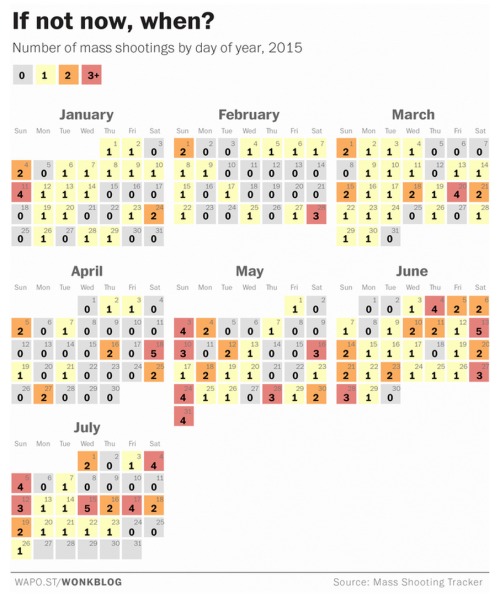
On average: One mass shooting a day

LAURENS, IA—Acknowledging the lack of any remotely interesting or entertaining attractions in the surrounding area, the wedding website for couple Adam Jessup and Rachel McHenry explicitly states that there is absolutely jack shit for guests to do while they’re in town, sources confirmed Monday. “There’s a Pizza Hut, a gas station, and that’s about it,” reads the website in part, candidly advising wedding guests in search of any food, drinks, or fun activities that they were shit out of luck because Laurens, IA is in the middle of fucking nowhere. “We recommend that guests stay at the nearby Fairfield Inn and Suites, but the place pretty much blows. It doesn’t have a pool or premium cable channels, so your best bet is to just hole up in your room watching whatever is on TNT until the ceremony.” The wedding website also frankly suggested that guests ...
On a recent trip to the grocery store, Barbarella Fokos met up with a man known as Farmer Bob who had with him in his front pocket a tiny baby skunk named Sweet William whom he rescued from the side of the road.
I geek out as I get to meet and hold Sweet William, who Farmer Bob will release very soon, as the little guy is getting way too big for his pocket. This baby skunk was found sick and orphaned on the side of the road, and Farmer Bob rescued it and nursed it back to health. For the first 2 weeks of its life, it slept in Farmer Bob’s pocket, and followed him around on the farm.

So this is what it feels like when doves make real estate investments. Minnesota’s public radio station The Current reports the house used as the residence of “The Kid” in the film Purple Rain is for sale. That’s right: The four walls and a roof that appeared in a movie 31 years ago, and is 100 percent a place Prince would not be caught dead living in, is on the market. For the eminently reasonable price of $110,000, it can be yours, so that you, too, can experience the vicarious thrill of looking around and going, “Eh, maybe for a movie I’d live here, like Prince.” By then it will be too late, and you’ll own the place, but still, that will be quite a moment.
You can take a closer look at the property in the online listing, and it’s a fairly appealing ...
A not-so-small part of Netflix’s plan for world domination capitalizing on entertainment has been its original animated series. While you and I have been busy watching back-to-back episodes of BoJack Horseman and Kitten Party (no seriously, it’s a thing, look it up), Netflix has been quietly building up a solid collection of kid-and-tween-friendly animated shows. One of their upcoming projects is called Project Mc², and is tied in with a set of toys that are geared towards getting girls interested in “S.T.E.A.M.” (Science, Technology, Engineering, Art, and Math).
According to IndieWire, Netflix’s description of the show is as follows:
Project Mc² follows four super-smart and science-skilled girls as they are recruited to join the spy organization, NOV8 (“Innovate”), and work together to save the day. … ‘Project Mc²’ shows that Smart is the New Cool(TM) incorporating S.T.E.A.M (Science, Technology, Engineering, Art, Math) in a fun way and depicting smart girls, that viewers can relate to, throughout the series.
First of all, how awesome is it that they’re including art in addition to STEM? Next, how awesome is it that this is a show that hopes to get more girls into these fields? There’s been a huge push lately trying to get more girls interested in STEM at a young age. It’s inspiring to see everyone planting these seeds in an attempt to bring more women into these industries. If these pushes affect the kind of change we’re hoping for, then the future looks pretty bright for women in STE(A)M.
Expect to see Project Mc² hit Netflix on August 7th.
—Please make note of The Mary Sue’s general comment policy.—
Do you follow The Mary Sue on Twitter, Facebook, Tumblr, Pinterest, & Google +?
When Fantastic Four cast Michael B. Jordan as Johnny Storm, a role Chris Evans played in the 2005 and 2007 film, we were super excited. However, there were some voices upset that Jordan wasn’t the traditional blond and white Johnny Storm.
Jordan has been handling the backlash with admirable patience and grace, and Stan Lee recently responded to the criticism in an interview with Entertainment Weekly.
I thought it was a great idea. They [the critical fans] are outraged not because of any personal prejudice… They’re outraged because they hate to see any change made on a series and characters they had gotten familiar with. In Spider-Man, when they got a new actor, that bothered them, even though it was a white actor. I don’t think it had to do with racial prejudice as much as they don’t like things changed.
Ok, mixed feelings. It’s great that Stan Lee’s vocally all for the casting, but arguing that the reaction isn’t racial is less great. Yes, lots of fans aren’t always comfortable with changes to series they like, but the protest against Jordan was basically “Human Torch can’t be black.” The Spider-Man analogy isn’t very good either, since you didn’t see nearly the same amount of backlash towards Miles Teller, Kate Mara, or Jamie Bell. People disproportionately angry about Miles Morales would probably be a more appropriate comparison.
It’s important to point out that even though Stan Lee’s intentions here are positive, misdiagnosing the reaction erases the representation issue within the comic/film industry. To work towards fixing those issues, we need to acknowledge that the outrage is racial. Lee also praised the character and diverse representation:
But I think they’re gonna get to love this character. So I’m not the least bit worried about it. I always tried to pepper these groups with as much racial diversity as possible because that’s the way the world is.
Again, while Lee awesomely acknowledges the importance of racial diversity, “pepper” probably isn’t the best word choice here. People of color aren’t seasoning for white casts, and this makes them sound like an afterthought. It’s also just some weird mental imagery. He’s right that I’ll probably love the new Johnny Storm though, just look at him!
What did you think of Stan Lee’s statement?
(via Comic Book Resources)
—Please make note of The Mary Sue’s general comment policy.—
Do you follow The Mary Sue on Twitter, Facebook, Tumblr, Pinterest, & Google +?

FLASH BACK to a night in October a few years ago. Most of us were adjusting to the gradual descent into fall: shutting our windows, wrapping ourselves in sweaters, getting to bed early. Esperanza Spalding was wide awake under a full moon, tapping into something beyond the timeline of shifting seasons and into shifting selves.
Before we get to that, a little background on Spalding: The Portland native is what some might call a prodigy; a multi-instrumentalist playing gigs in blues clubs by her teens, enrolled in the music program at Portland State University by 16, graduated from and hired by the Berklee College of Music as a bass instructor by 20, personally selected by President Barack Obama to play the Nobel Peace Prize Concert by 25, and of course, a four-time Grammy Award winner (including Best New Artist). Though she's best known as a jazz bassist, Spalding's music embodies elements of pop, soul, and hip-hop. She sings, too, in multiple languages—to give you an idea of the pace of Spalding's mind and talent.
Now, back to that October night. Spalding was in bed after a gig with her trio (Geri Allen and Terri Lyne Carrington), watching a band on Late Show with David Letterman, when something clicked.
"I started singing demos [of songs] I was hearing, like descriptions: 'sneaker cherry prophet'—words that don't mean anything, but the sensation you feel from their combination gives you a taste that then you try to find through the medium of a whole song," Spalding says. "It just kept unpacking from there."
 This weekend, I happened upon the recent re-release trailer for Blade Runner (The Final Cut). The Final Cut version of the film, the only one where director Ridley Scott had full artistic control, was first released in 2007, but this spring, theaters started showing it again and this new trailer […]
This weekend, I happened upon the recent re-release trailer for Blade Runner (The Final Cut). The Final Cut version of the film, the only one where director Ridley Scott had full artistic control, was first released in 2007, but this spring, theaters started showing it again and this new trailer […]
The post Inside Blade Runner’s Model Shop appeared first on Make: DIY Projects, How-Tos, Electronics, Crafts and Ideas for Makers.
The comedian received a comment that threatened "a bullet" against him, only for the company to initially say that it didn't constitute a threat.
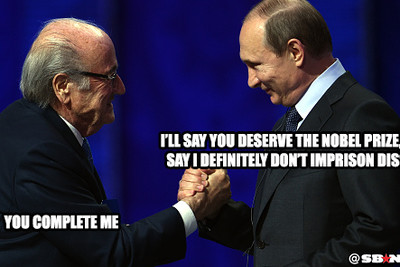
There are a lot of people who deserve to win the Nobel Prize. Doctors who work in dangerous places, researchers who cure horrible diseases, leaders who help promote equality and fairness across the world. Vladimir Putin thinks Sepp Blatter belongs in this group, according to Reuters.
"I think people like Mr. Blatter or the heads of big international sporting federations, or the Olympic Games, deserve a special recognition. If there is anyone who deserves the Nobel prize, it's those people."
Okay, let's break this down. There are currently Nobel Prizes in Physics, Chemistry, Medicine, Literature, Economic Sciences and the Peace Prize.
There are only two that are even vaguely applicable, which are Economic Sciences and the Peace Prize. Let's throw Economic Sciences out the window, since, yanno ... Blatter's organization is being investigated in a widespread corruption scandal. That leaves the peace prize. These are the last five winners of the Nobel Peace Prize:
2014
Kailash Satyarthi and Malala Yousafzai
"For their struggle against the suppression of children and young people and for the right of all children to education"
2013
Organisation for the Prohibition of Chemical Weapons (OPCW)
"For its extensive efforts to eliminate chemical weapons"
2012
European Union (EU)
"For over six decades contributed to the advancement of peace and reconciliation, democracy and human rights in Europe"
2011
Ellen Johnson Sirleaf, Leymah Gbowee and Tawakkol Karman
"For their non-violent struggle for the safety of women and for women's rights to full participation in peace-building work"
2010
Liu Xiaobo
"For his long and non-violent struggle for fundamental human rights in China"
Sepp Blatter belongs on this list the same way Vladimir Putin belongs on the list of "nicest world leaders who definitely won't put you in prison for questioning their government."

The 25-year-old will reportedly call it a career rather than get back surgery.
Former Miami Dolphins and San Francisco 49ers offensive lineman Jonathan Martin is calling it a career, according to Ian Rapoport of the NFL Network. Martin has a back injury that would require surgery and likely sideline him next season anyway, so he's electing to retire instead.
Martin was drafted in the second round of the 2012 NFL Draft by the Dolphins and played in all 16 games in his rookie season. His time with the Dolphins was short-lived, however, as the 2013 campaign was derailed in a bullying scandal involving Richie Incognito. Martin had been slotted in as the starting left tackle, but he left the team in October, citing "emotional" reasons.
Eventually, it came out that Incognito was the "ring leader" in the harassment of Martin, going back to his rookie year with the team. Incognito, Mike Pouncey and John Jerry were all named in a 144-page report by Ted Wells outlining the pattern of bullying. Both Martin and Incognito eventually left the Dolphins, with Martin being traded to the 49ers.
Martin wound up being the backup swing tackle and started multiple games with Anthony Davis missing time due to injury. He had an average season in that role then was waived by the team in March. The Carolina Panthers claimed Martin off of waivers, but he won't play a snap for them now that he's elected to call it a career. Incognito is still in the league, and is set to play for the Buffalo Bills in 2015.
SB Nation video archives: The NFL's hazing problem (2013)
|
Courtney
shared this story
from |
firehoseNIST!

Investigators say evidence recovered from an explosion Saturday at the National Institute of Standards and Technology near Washington, D.C. is consistent with the production of methamphetamine. The evidence? “Pseudoephedrine, drain opener, and a recipe for methamphetamine.”
firehosewatermelon gif followup





firehosevia Rosetopher Lindtz
firehosevia Bunker.jordan
I spend more of my time and energy talking about politics to strangers on the Internet than I ever thought I would, and over the last few years of participating in the events and conversations around Occupy, Ferguson, GamerGate, Baltimore, and every other flashpoint in this on-going culture war, I’ve noticed a problem.
Specifically, I’ve noticed a problem with the way the left-to-far-left folks – you know, the vast and contradictory coalition known as “progressives” – engage in political discourse online (and probably in person, too, though I can’t say I’ve noticed this as much). The problem starts, I think, because we often place too much emphasis on highlighting the fucked-up things people say or do, and demand that blood and sanctions be exacted upon the person who fucked up.
This behavior has yielded plenty of thinkpieces coming from across the political spectrum indicting the modern “call-out culture”, which leaves people afraid to make mistakes publicly or say the wrong thing for fear of being pounced on by the people they thought of as allies.
Thing is, I don’t think the problem is actually the call-out itself; I think that is a powerful tool in identifying our own problematic behaviors and becoming better people.
I think that the problem isn’t calling people’s behavior out so much as the lack of intellectual humility that I have been seeing in the execution of the public call-out. I feel like many times I see someone tweet about A Horrible Thing Someone Said with a slight sense of glee lying beneath a pious veneer.
I see people accumulating political capital – typically by accumulating masses of followers and influential retweeters to build their capacity to influence online discourse – by drawing attention to shitty things that people do and say. They’re consciously performing as a Good Person On The Internet, and people follow them so that they can also feel like Good People On The Internet.
That makes me feel super weird and uncomfortable for all kinds of reasons. We end up seeing Good People On The Internet disagree, and the conversations end up polarizing between two camps united behind personalities, not critical analysis. People aren’t arguing about whether X message or Y action was racist or sexist, they’re arguing about whether they think Person A is a better human being than Person B.
It’s demagoguery, not critical thinking, and it leads us to start reducing political ideologies down to factions and figureheads. What’s worse, we often end up reproducing the same damn privilege structures we’re fighting against in our own movements, as the influence and political capital ends up going to privileged allies who get to feel like they’re The Good People. (Just think about how much attention and fawning white dudes get for tweeting about social justice-y stuff.)
Hopefully if you’ve read this far, you should start feeling a little bit prickly. You’ve probably engaged in some of the same public performance of Good Personhood, or blindly retweeted an opinion by a known Good Guy just so you can make sure everyone knows you’re On The Level, or something like that. Good! That’s exactly how you should be feeling.
Learning to be good people
I originally titled this essay “The New Progressive Religion” because, from my outsider’s perspective of religion I see some parallels that might better help explain the issues I’m talking about.
I grew up in the Bay Area – born in San Francisco, moved to Oakland when I was about 14. I wasn’t brought up to be very religious, though my family on both sides were Catholic. I never quite understood what grown people got out of practicing religion as a kid, but as an adult, though, I think I get it: I want to be with people who have similar ideas about what it means to be a good person (and to be good people to each other) as I do, so if I can find an ideology that accurately captures this, all I need to do is find people who share that ideology and I’m set.
Both religion and politics are trying to answer an old question – “How can we be good people to each other?” – typically by laying out a system of ethics and then prescribing behaviors and rules based on those ethics. Organized religion tries to answer this question with texts that we use to parse a divine being’s will; intersectional feminism tries to answer the question by analyzing how our individual relationships to other people are mediated by power we wield over each other but don’t fully understand.
Now, when you start incorporating ideological teachings into the way you live your life, there isn’t really a lossless copying method. There is no perfect follower of Christ, just as there is no perfect feminist; practicing either is a constant process of study to figure out how to interpret ideology into action, and then learning from the results of the action to better clarify or refine the source ideology.
So, with religious folks, you get some people who put a whole lot of work in studying and analyzing, and you get some people who go to Church once a week and listen to the teachings because that’s what everyone in your city does. In my experience, the people who put more work into studying their religion are the ones that tend to be the most accepting and open-minded and are pretty good at Being Good People, while the people who treat the learning process as one-way end up holding a set of rules as sacred even when doing so seems contrary to the end goal of Being Good People.
This is what I’ve been seeing in progressive spaces: There are people who study and critically interrogate their practice of their ideologies, and there are people who treat Progressive Social Justice Politics Stuff as a dogmatic set of behaviors and attitudes and use their adherence to and others’ deviance from to define themselves as Good People.
Which is ridiculous, because the experiences and ideologies at the core of that Progressive Social Justice Politics Stuff are constantly being challenged, iterated on, and added to, so the idea that anyone could be dogmatic about it seems kind of bizarre.
The need for intellectual humility
I never felt a strong need for religion in my life. I think this is because when I was in college, I started being actively involved in my campus Asian American community, working in both social and political organizations, and cultivating my knowledge of intersectional feminism through study and practice. It was kind of funny, actually – I majored in Philosophy and generally felt like all the ethics stuff we studied was more of a logician’s circlejerk, while the electives I took in the Asian American Studies department were directly relevant to giving me the tools I needed to start trying to make sense of the world and How To Be A Good Person.
One of the side effects of studying this kind of thing in school is that our professors did a great job impressing upon us that this field of knowledge is incomplete. The words and theoretical frameworks they gave us so that we could begin to describe the experiences we shared but couldn’t name were still works in progress. The academic roots of ethnic studies, like any other political theory or philosophy work, came from intelligent people finding ways to understand the people around them. We were just testing the waters. We read selections of the core texts, but never the full texts, or perhaps never all the texts. Not that you need to find this in school, mind you – but for a guy like me who is prone to thinking he is smarter than he actually is, it sure fucking helped.
This inculcated in us a certain kind of ideological humility. When you see thinkpieces explaining why X action is actually kind of racist, the part that explains why it’s racist isn’t handed down from a monk on a mountain; it’s the intellectual outcome of applying a theory of power that helps us understand how we can unintentionally hurt or suppress each other. This theory is constantly being challenged, iterated, and refined as people continue to build this body of knowledge based on contributing their experiences and understandings to the pile. Being Good is not a solved problem.
So we continue to study, and we continue to practice our politics expecting these theories to change – expecting someone smarter than us to come by and explain to us that we’re wrong, that we missed something.
And when it comes to applying the knowledge we have of How To Be Good People to criticize each others’ behavior, we should strive to do so knowing that our understanding is imperfect and we are seeking to improve upon it, not to draw battle lines between mini-celebrities or jockey for social and political position.
Here’s the thing, though: I arrived at my current political beliefs by taking a bunch of really great college classes with a bunch of really great (and endlessly patient) professors, and then taking than knowledge and working through it in daily life with my friends, family, and loved ones. It’s a painful process, and near as I can tell, it never stops.
And when I see people tweeting up a storm about some fucked up shit, it sometimes comes off as though that speech isn’t coming from an ideological base that is carefully cultivated, but from a set of internalized rules. Kind of like the guy in your local health and fitness forum who spouts off all the “right” advice for lifting and dietary regime but couldn’t actually tell you how it works (and where it might not).
People go to school specifically to study this kind of thing!
People who haven’t even been born yet are going to go to school for this shit, and write some amazing books that will make everything we know about being Good People look as hopelessly barbaric as slavery does now!
Some people don’t really have to go to school for this shit because they live it every day!
We’re all complicit in interlocking systems of oppression that ruthlessly fuck over our fellow human beings and we’ll probably never in our lifetime manage to be even net-neutral in terms of our impact on other people!
Forget being a Good Person – the best we can hope for is probably “Less Shitty People Than Everyone Around Us”!
None of the above factors should stop anyone’s desire to be a Good Person in the slightest – but it should put our own efforts to do work on ourselves in perspective, I think. Especially when we choose to take on the responsibility of pointing out how someone else could be a Good Person.
Asking people to change their lives super hard and we should treat it as such
I think that one of the hardest things to do as a person is tell someone that you know how to live their life better than they do. It’s a pretty bold assertion, and we shouldn’t do it lightly! But it’s kind of what we’re doing in a call-out.
When we call out shitty behavior, we are trying to communicate that a certain action caused injury: Hey, you said this thing and it was pretty hurtful for Reasons, and if you are trying to be a Good Person, I think it would be a good idea to make amends and not do this thing again.
But it’s very easy for that call-out to become something sinister: Hey, you said this thing and it was pretty hurtful for Reasons, and I want people to know that I am a Good Person and you are a Not Good Person.
One comes from a place of desire for mutual improvement; the other comes from a desire for personal validation at another’s expense. One is productive; the other is not.
What’s more, I don’t actually think it’s easy to tell in the moment how much of a call-out is motivated by selfish vs. selfless reasons. These are a few questions that I often ask myself, though, and they might help you as well:
- Are you publicly broadcasting your call-out because you want the attention, or because you feel like your call-out’s success depends on others’ signal boosting?
- Are you privately communicating your call-out because you think it’ll be more helpful for the recipient, or because you want them to save face?
- Are you using your voice instead of amplifying others’ because you want the spotlight, or because you want to put yourself on the line as a visible supporter?
- Are you signal boosting someone else because you want to amplify marginalized voices, or because you don’t want to stick your own neck out?
- Are you being witty because you want your hot take to be the one that wins Twitter, or because you feel like your wit serves to better illustrate the damage done?
- Are you as vocal in sharing the good as you are in calling attention to the bad?
- Are you holding strangers on the Internet to higher standards of behavior as you do your friends?
If you have your own suggestions on ways to keep yourself honest, I’d sure as hell love to hear ‘em.
Be excellent to each other
I know there are some people reading this thinking, “Patrick, you jerk, you just wrote this thing so people will think you’re a Good Person. You’re performing Good Person just like everyone else.”
I can see why you would think that way! I used to be much more invested in the idea of appearing like a Good Person than actually behaving as such; it’s a thing I am still working on.
Believe me: I don’t like getting in Twitter fights with people because I think it’s super hard to actually change people’s opinions most of the time, and so it just becomes mutual public grandstanding in order to appeal to and broaden your follower base. I don’t think my opinions are anything special, and I wish people would pay attention to me for the neat stuff I would like to someday make or the stupid jokes I write on Twitter, not this post. And when I do call something out, I have a sinking feeling of dread in my stomach as it starts to spread around the Internet, because I know that there are lots of people out there smarter than I am about this stuff. If you see me grandstanding, tell me.
Let’s stay humble, be excellent to each other, and…
https://www.youtube.com/watch?v=W0uVwVUVsbY
…you know the rest.
The moment Sadafumi Uchiyama saw a photo of an object that landed on an Oceanside beach in 2013, he knew what it was.
Uchiyama, curator of the Portland Japanese Garden, recognized the carved 14-foot relic as the iconic red crossbeam of a Shinto shrine gate.
Uchiyama, 60, is a third-generation professional gardener who left Japan as a young man to renounce anything to do with gardens, but who couldn't escape his fate. In April 2013, a month after the first landing, he grew even more curious when a second matching crossbeam landed on a Florence beach.
Were they remnants of the tsunami two years before that leveled cities along Japan's east coast, killing more than 18,000? Which temple, in a nation of 80,000 shrines, might be missing a pair of crossbeams?
For more than a year, Uchiyama searched obsessively for the home of the crossbeams, called "kasagi" in Japanese. He traveled through the three prefectures hit hardest by the tsunami. He showed photos to cabbies, restaurant patrons and anyone else who'd listen. He appeared on Japanese television.
Uchiyama's search, and his clever solution to the puzzle, were born of compassion for Japanese who have suffered physically and emotionally since the apocalyptic 2011 destruction.
firehosevia Rosalind
Lindsay Oliver, Deputy Program Director
We're beginning our first round of hiring, and couldn't be more excited to bring other passionate humanitarians onto the Cadasta team.
Since our staff is decentralized & distributed (like our soon-to-be technology platform), anyone from anywhere on Earth can apply. As a non profit committed to helping multicultural communities across the globe assert their land rights, we'd like to extend a special invitation to people who aren't well-represented in the tech industry, including women, People of Color, People with Disabilities, members of the LGBTQ+ community, etc.
Being a part of Cadasta means you get more than just a (competive) paycheck. As a people-first company, our values focus on creating a community of trusted collaborators that are invested in each other's sucesses. Our supportive, learning-focused environment empowers our staff to create positive impact through ownership of roles and access to engaged leadership. These values are also reflected in customizable benefits and recognition that are meaningful to the individual.
Check out our jobs page to learn more about our company culture, benefits structure, and currently open positions.
firehosevia Rosalind
hi otters
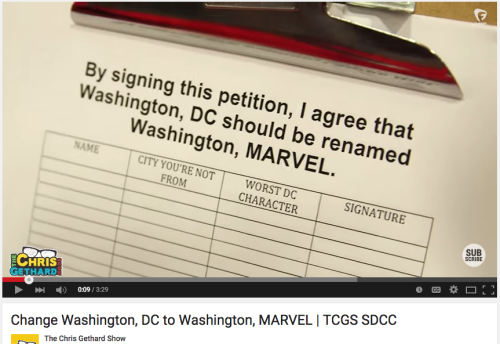
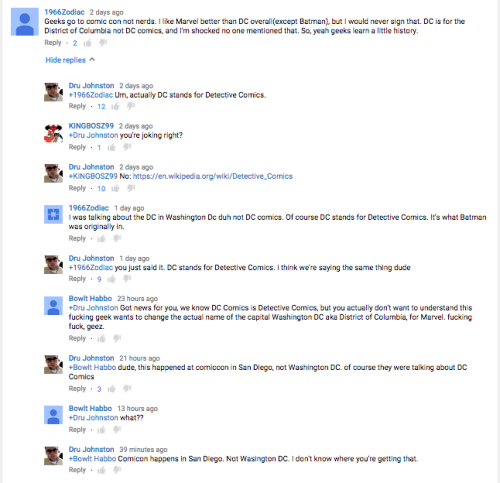
Some say I’m doing God’s work. But I maintain I’m just a man.
I love that this exists, and I wish that I had thought of it first.
firehosevia Toaster Strudel
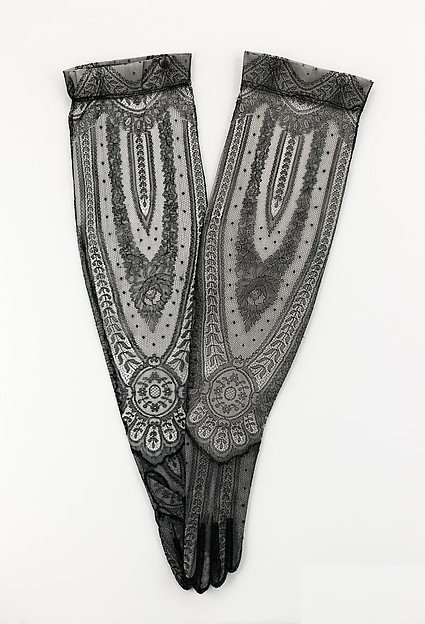
Evening Gloves
Suzanne Tablot, 1930
The Metropolitan Museum of Art
firehosevia Osias Jota

firehosevia Rosalind
In her new book, The Internet of Garbage, Sarah Jeong states that "the Internet is, and always has been, mostly garbage." She talked with The Toast about topics discussed in her book, including online harassment, doxing, spam, free speech, and the challenges of moderating content platforms and social media networks. You can buy Sarah's book on iTunes or Amazon.
The Toast: If the Internet has always been mostly garbage, why did you write this book now? Do you think we're better positioned in terms of either will or technology to take more of the garbage out?
Sarah Jeong: The book positions online harassment as part of a larger category of long-extant problems, but when it comes down to it, it's still a book about online harassment. One of the things I wanted to do with the book was to hammer in how online harassment has been around forever -- but I don't think there would have been an audience for the book until fairly recently. There's a lot more mainstream awareness of harassment and online misogyny in particular.
Why do you think that is? More media coverage, more survivors of online harassment speaking out?
100% media coverage. Part of that has to do with journalists being aggressively harassed -- the journalists then turn around and use their platforms to show the world what is happening to them.
But that's not the whole story. The Internet now includes a much broader swath of the entire population, which means that the old trite victim-blaming along the lines of "it's just the Internet" doesn't work so well. We now recognize the Internet as just another arena for our day-to-day lives, a place that's no less real than the offline world. The Internet's ubiquity also means that large-scale incidents of harassment become very large-scale, sucking in celebrities, journalists, even entire media organizations.
In the book, you mention some of the issues with media coverage of harassment -- from reports not being clear about the definition of "doxing" to the focus on white cis women who've been harassed to the tendency to make harassment seem smaller or less threatening, less real-world, than it really is. Now that we are talking about it more, how can we ensure better, more accurate coverage of this issue? (Apart from sending a copy of your book to every single member of the media!)
The most important thing to address is how people of color -- particularly black women -- are either erased or villainized when we talk about online harassment. I would love to see a book about online harassment that centers on people of color. I wish my book could have done that, but unfortunately, there just aren't a lot of studies on, for example, how race exacerbates harassment. There aren't a lot of media accounts, either. When black women get harassed, either their stories never appear in the media, or their stories get retold, blaming the black woman for the ensuing harassment. See, for example, Jon Ronson's shameful treatment of Adria Richards.
This isn't just an issue of equitable treatment in the media. It actually has serious policy ramifications. Some of the most prominent funded anti-harassment activism centers on carceral remedies -- that is, resorting to police, prisons, and the criminal justice system. If you're a person of color, trans, and/or a sex worker, you may be less willing to go to the police.
A related problem is how the problem of harassment is cast as "a torrent of mean words." And yes, a torrent of mean words really sucks to experience, and user interfaces should be designed to mitigate that, but that's just froth on top of things like having your address published, your social security number published, your children threatened, your accounts hacked, strange packages arriving your door, strangers following you around your city. One reason why the media focuses on unruly speech over, say, doxing or stalking or swatting, is that mean tweets are out there in the open for everyone to see. No need to do any actual reporting. But this tendency is very harmful. It treats targets like they are fearful and upset because of "mere words." Targets of sustained harassment aren't thin-skinned, they're often being subjected to campaigns aimed at making them afraid.
Read more An Interview with Sarah Jeong, Author of The Internet of Garbage at The Toast.